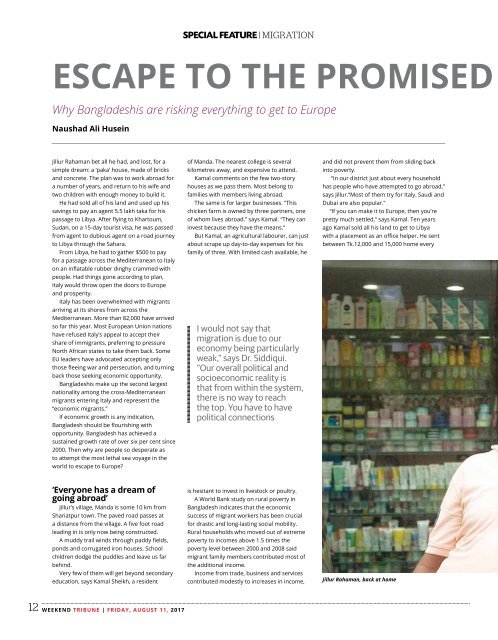Weekend-5-16
Create successful ePaper yourself
Turn your PDF publications into a flip-book with our unique Google optimized e-Paper software.
special feature | migration<br />
Escape to the promised<br />
Why Bangladeshis are risking everything to get to Europe<br />
Naushad Ali Husein<br />
Jillur Rahaman bet all he had, and lost, for a<br />
simple dream: a ‘paka’ house, made of bricks<br />
and concrete. The plan was to work abroad for<br />
a number of years, and return to his wife and<br />
two children with enough money to build it.<br />
He had sold all of his land and used up his<br />
savings to pay an agent 5.5 lakh taka for his<br />
passage to Libya. After flying to Khartoum,<br />
Sudan, on a 15-day tourist visa, he was passed<br />
from agent to dubious agent on a road journey<br />
to Libya through the Sahara.<br />
From Libya, he had to gather $500 to pay<br />
for a passage across the Mediterranean to Italy<br />
on an inflatable rubber dinghy crammed with<br />
people. Had things gone according to plan,<br />
Italy would throw open the doors to Europe<br />
and prosperity.<br />
Italy has been overwhelmed with migrants<br />
arriving at its shores from across the<br />
Mediterranean. More than 82,000 have arrived<br />
so far this year. Most European Union nations<br />
have refused Italy’s appeal to accept their<br />
share of immigrants, preferring to pressure<br />
North African states to take them back. Some<br />
EU leaders have advocated accepting only<br />
those fleeing war and persecution, and turning<br />
back those seeking economic opportunity.<br />
Bangladeshis make up the second largest<br />
nationality among the cross-Mediterranean<br />
migrants entering Italy and represent the<br />
“economic migrants.”<br />
If economic growth is any indication,<br />
Bangladesh should be flourishing with<br />
opportunity. Bangladesh has achieved a<br />
sustained growth rate of over six per cent since<br />
2000. Then why are people so desperate as<br />
to attempt the most lethal sea voyage in the<br />
world to escape to Europe?<br />
of Manda. The nearest college is several<br />
kilometres away, and expensive to attend.<br />
Kamal comments on the few two-story<br />
houses as we pass them. Most belong to<br />
families with members living abroad.<br />
The same is for larger businesses. “This<br />
chicken farm is owned by three partners, one<br />
of whom lives abroad.” says Kamal. “They can<br />
invest because they have the means.”<br />
But Kamal, an agricultural labourer, can just<br />
about scrape up day-to-day expenses for his<br />
family of three. With limited cash available, he<br />
I would not say that<br />
migration is due to our<br />
economy being particularly<br />
weak,” says Dr. Siddiqui.<br />
“Our overall political and<br />
socioeconomic reality is<br />
that from within the system,<br />
there is no way to reach<br />
the top. You have to have<br />
political connections<br />
and did not prevent them from sliding back<br />
into poverty.<br />
“In our district just about every household<br />
has people who have attempted to go abroad,”<br />
says Jillur.“Most of them try for Italy. Saudi and<br />
Dubai are also popular.”<br />
“If you can make it to Europe, then you’re<br />
pretty much settled,” says Kamal. Ten years<br />
ago Kamal sold all his land to get to Libya<br />
with a placement as an office helper. He sent<br />
between Tk.12,000 and 15,000 home every<br />
‘Everyone has a dream of<br />
going abroad’<br />
Jillur’s village, Manda is some 10 km from<br />
Shariatpur town. The paved road passes at<br />
a distance from the village. A five foot road<br />
leading in is only now being constructed.<br />
A muddy trail winds through paddy fields,<br />
ponds and corrugated iron houses. School<br />
children dodge the puddles and leave us far<br />
behind.<br />
Very few of them will get beyond secondary<br />
education, says Kamal Sheikh, a resident<br />
is hesitant to invest in livestock or poultry.<br />
A World Bank study on rural poverty in<br />
Bangladesh indicates that the economic<br />
success of migrant workers has been crucial<br />
for drastic and long-lasting social mobility.<br />
Rural households who moved out of extreme<br />
poverty to incomes above 1.5 times the<br />
poverty level between 2000 and 2008 said<br />
migrant family members contributed most of<br />
the additional income.<br />
Income from trade, business and services<br />
contributed modestly to increases in income,<br />
Jillur Rahaman, back at home<br />
12<br />
WEEKEND TRIBUNE | FRIDAY, AUGUST 11, 2017


















